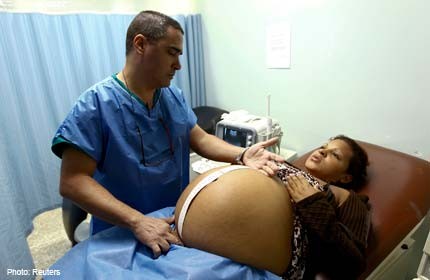Women's lung cancer risk not tied to childbirths


A woman's lung cancer risk doesn't appear to be linked to the number of children she has, although some scientists had thought hormonal changes during pregnancy might protect against the disease.
That's according to a new report that sums up 16 previous studies on the topic, which researchers have explored to get a better understanding of lung cancer and possible treatments.
If lung cancer in women were tied to hormones the same way some breast cancers are, for instance, similar drugs might be effective against both diseases, said Jessica K. Paulus, who worked on the analysis.
So far, however, studies haven't agreed on whether or not pregnancies -- and by extension hormones -- play a role in lung cancer.
That was also clear from the new work, said Paulus, of Tufts University in Medford, Massachusetts.
"If you look at the component studies, they are all over the map," she told Reuters Health, adding that she and her colleagues had hoped to be able to explain that variation.
"We came up relatively empty-handed," Paulus said. "It makes it difficult to interpret our findings."
Lung cancer is the leading cause of cancer deaths in the U.S., according to the American Cancer Society.
The disease is rare in younger adults, but becomes more common as people grow old. Overall, the risk of getting lung cancer is about one in 13 for men and one in 16 for women. But these overall numbers include smokers, whose risk is many times higher than that of non-smokers.
"Both active smoking and exposure to second-hand smoking are some of the strongest risk factors for lung cancer," said Paulus. "Quitting smoking and quitting soon is associated with reducing your risk of lung cancer."
Despite the new findings, Paulus added that a link between childbirths and lung cancer still can't be ruled out. She said she hopes a more in-depth analysis of the existing evidence -- including detailed data on each woman -- might help close the issue.